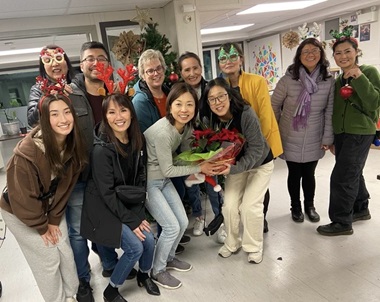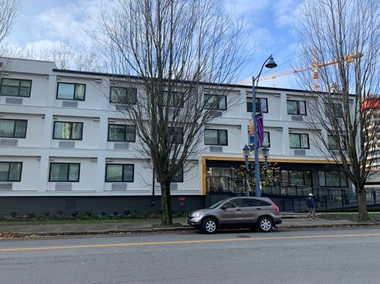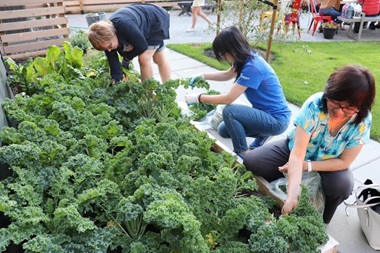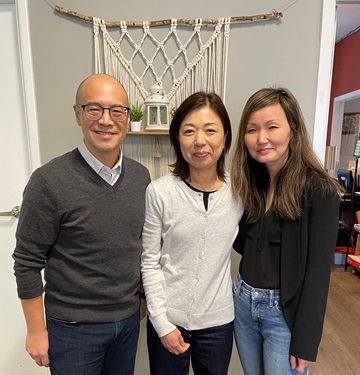
The Tapestry Church’s ‘Flourish’ team works with their temporary modular housing neighbours.
On February 28, 2018, I walked into the main branch of the Richmond Public Library to pick up a few books. To my surprise, the library was jammed packed. I had never seen so many people at the library before. What was going on?
I discovered it was an open house related to the temporary modular housing (TMH) building for homeless that the city was planning to build just around the corner on Elmbridge Way. You could feel the energy in the room, shaped by the loud shouting between modular housing advocates versus NIMBY (not in my backyard) supporters.
Most people were queued up in a long line to sign a petition to oppose the modular housing. I left the library before the infamous Bruce Lee kick, when an upset young Asian male ran at an older female librarian with a flying kick to her stomach.
Amidst all that controversy, a number of people from faith communities in Richmond began to speak up, including a member of the Tapestry Church who was instrumental in starting a petition in favour of the TMH project. (See https://churchforvancouver.ca/coalition-supports-modular-housing-for-homeless-in-richmond/)
Welcoming modular housing neighbours

Temporary modular housing in Richmond.
In the end, the 40-unit Richmond TMH was built, with residents moving in April 23, 2019. Since then, the Tapestry has provided support and connection to the residents who now live at 7300 Elmbridge Way.
When Akiko Holz, an education assistant in a public elementary school and a member of the Tapestry, heard of the church’s initiative to support the residents, she immediately signed up to help:
When I heard that the youngest residents were only 19, I thought it was too young of an age to be homeless. They needed family. They needed to be loved. At that time, I myself had three teenage children. I felt called by God to help and support, especially those young people.
Since that initial call, Akiko along with other members of the church – a group now called ‘Flourish’ – began to head down weekly to do what they could.
At first, everything took place outside the building. Akiko and the rest of the 15-member team helped build, plant and tend their community garden. They also dropped off clothes, toiletries and baked goods. After a while, she said:
There was trust being built, and then we were invited to come inside the building. Now, we also have a time of games, arts and crafts, conversations and even prayer.
In this process of building relationships with residents and the homeless, Akiko and the rest of the Flourish team have realized that the greatest need for residents in the TMH facility is not just about food and gardening and art supplies, but about kindness and relationship. It’s not about housing, it’s about a home. It’s about friendship. It’s about a being a good neighbour.
Psalm 146
Psalm 146 is a great Psalm. It begins with the words ‘Praise the Lord’ or in the Hebrew, the word ‘Hallelujah.’ Hallel means ‘praise’ and Jah is short for ‘Yahweh.’ The Psalm thus begins with Praise Yahweh. The Psalm ends with Praise Yahweh. Worship begins and ends with God. Our worship of God brackets all of life.
1 Praise the Lord.
Praise the Lord, my soul.
2 I will praise the Lord all my life;
I will sing praise to my God as long as I live.
3 Do not put your trust in princes,
in human beings, who cannot save.
4 When their spirit departs, they return to the ground;
on that very day their plans come to nothing.
5 Blessed are those whose help is the God of Jacob,
whose hope is in the Lord their God.
6 He is the Maker of heaven and earth,
the sea, and everything in them—
he remains faithful forever.
7 He upholds the cause of the oppressed
and gives food to the hungry.
The Lord sets prisoners free,
8 the Lord gives sight to the blind,
the Lord lifts up those who are bowed down,
the Lord loves the righteous.
9 The Lord watches over the foreigner
and sustains the fatherless and the widow,
but he frustrates the ways of the wicked.
10 The Lord reigns forever,
your God, O Zion, for all generations.
Praise the Lord.
The Psalm begins with blessing. In verse 5, the Psalm proclaims that both our help and hope is in the Lord. To make the point, the name of the Lord (Yahweh) is mentioned a whopping 11 times in this Psalm!
But what is interesting is the charge or the challenge in the Psalm that comes right after. From verses 7 – 9, the psalmist clearly describes how we can demonstrate our worship. Yes, God, the creator, blesses us – but God also blesses and takes special care of those who need him most.
In particular, as outlined in this Psalm, God defends those who cannot defend themselves (the oppressed, the hungry, the prisoner, the blind, the foreigner, the orphan and the widow).
Theologian Nicholas Wolterstorff, when looking through the Bible for all the instances of the word for justice, noticed that in most places four groups of people are mentioned right alongside the word justice. They are the widow, the orphan, the foreigner and the poor. He calls them “the quartet of the vulnerable.” These are the people who are most vulnerable, oppressed and who need justice.
Justice is not only about retribution or punishment for the things that someone does wrong, but justice is also about fairness and charity and equality for what people deserve. If everyone is made in the image of God, then shouldn’t we all be considered equal and deserving of the same? God is a God of justice. God feeds the poor. God protects the widow and orphan. God welcomes the refugee. And we see this vividly in Jesus. During His ministry on earth, Jesus revealed God’s love by helping the hungry, the poor and the outcast.
Jesus’ early ministry

Gardening with residents of the temporary modular housing.
In fact, don’t these words in Psalm 146 sound familiar? They should. They are later found in Isaiah 61, when Isaiah prophesied about a servant king or Messiah that would come and inaugurate a time of Jubilee, when the poor would be delivered and oppression would cease.
And these same words are found again as spoken by Jesus himself. In Luke 4, as Jesus begins His earthly ministry, Luke records Jesus’ first ever sermon:
16 He went to Nazareth, where he had been brought up, and on the Sabbath day he went into the synagogue, as was his custom. He stood up to read, 17 and the scroll of the prophet Isaiah was handed to him. Unrolling it, he found the place where it is written:
18 “The Spirit of the Lord is on me,
because he has anointed me
to proclaim good news to the poor.
He has sent me to proclaim freedom for the prisoners
and recovery of sight for the blind,
to set the oppressed free,
19 to proclaim the year of the Lord’s favour.”
20 Then he rolled up the scroll, gave it back to the attendant and sat down. The eyes of everyone in the synagogue were fastened on him. 21 He began by saying to them, “Today this scripture is fulfilled in your hearing.”
Jesus deliberately chose that particular passage in Isaiah. In Jesus’ first sermon, it becomes clear what His mission and message was all about. His message was to proclaim good news! Good news is not only about deliverance from sin; it is also about deliverance from poverty, oppression and slavery. Jesus says himself, “Today this scripture is fulfilled in your hearing.” In other words, the kingdom of heaven has arrived!
How to respond?
So, how do we do it? How might we work for a world where God’s good intentions are realized? Ever since I started wrestling with Jesus’ vision for the world, I have wondered how to live out this vision to love those who are oppressed, left-out and live in poverty.
The affordable housing and the homeless issue in the Lower Mainland is so complex. Churches, such as my own, are trying to figure out how to respond. Perhaps you or a group you belong to are grappling with the same kind of questions.
I love hearing about the many multifaceted and compassionate ways in which different people and groups have responded to these issues. I definitely don’t have any answers and feel overwhelmed sometimes by the weight of these problems, but with the leading of the spirit, I pray that the whole of society will do what we can right now.
Becoming friends with those who live in temporary modular housing is just one small way in which we can respond.
Extending the lease
The TMH building was meant to be just that, temporary. The City of Richmond has plans to construct a separate 60-unit permanent supportive housing building. However, that building will not be completed until 2027. City council met November 6 to consider a proposal to extend the lease and operation of the TMH building until then.
At this council meeting, 15 groups from the community presented their case, with 14 of them – consisting of neighbouring residents, strata representatives from nearby condo complexes and local businesses – calling for removal of the TMH.
The single group that spoke in favour of this extension was The Tapestry Church, represented by Pastor Karen Schaffer and Pastor Michael Yang. As expressed in the church’s letter to city council:
It reveals the particular social good that is available when these residents have a more permanent place to call home. They can welcome and entertain neighbours like us.

Albert Chu, Akiko Holz and Karen Schaffer actively support their neighbours.
After deliberations, city council approved the extension of the TMH building.
Akiko is pleased that she can continue building on the relationships she has formed over the last five years. “This is God’s work. It’s not my work, but it’s God work. He’s got it all. He provides.”
She tells the story of how many residents didn’t show much interest in God at first, but now sometimes they are the ones who come to ask for prayer. And so, they all join in a circle, arms around each other, for a time of prayer. And sometimes “it’s the residents who are the ones who start the prayers; it’s beautiful.”
Albert YS Chu is Director of the Centre for Missional Leadership at St. Andrew’s Hall. He is also Lead Pastor of the Tapestry Church, a multi-campus church in the Lower Mainland.
